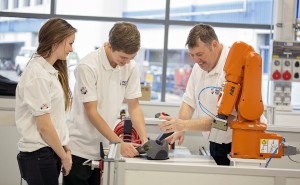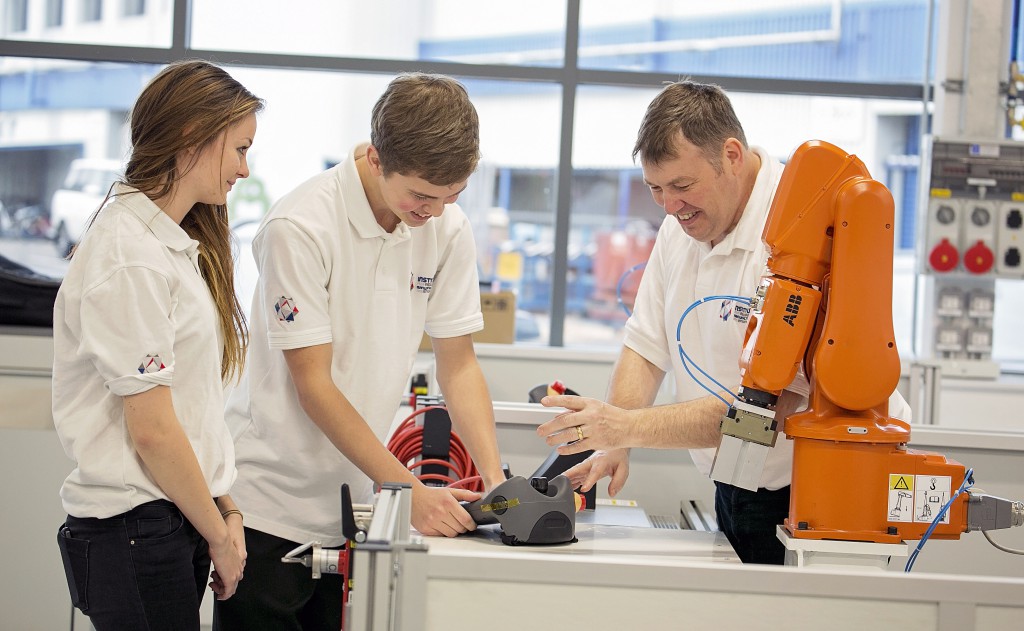The education strategy at Coventry University has long been based on an enquiry-led approach to learning. The premise is that, whilst we all learn differently, most people learn best by being exposed to both theory and practice. Developing learning space, physical and intellectual, for practice can challenge the institution’s estate, the academic who moves from being teacher to facilitator and the student who may need more time to practise activity. None of these are acceptable reasons not to try if, at the end of such a process, the learner is capable of much more.
Enquiry-led learning is a broad term that encompasses many practices including, most notably, a problem-based approach to learning. Much has been written over the years about the values and virtues of a problem-based curriculum. The medical curriculum at McMaster in the 1960s, the establishment of the University of Aalborg and indeed work done at Coventry from the 1980s to date in Engineering and Health, are all examples that are discussed in the literature. Work published by Coventry along with the Royal Academy of Engineering and the Gordon-MIT Engineering Leadership Program into studies about the effectiveness of such approaches indicated both enhanced student retention and student achievement, when compared to a more traditional curriculum.
By bringing many sources of information together for, and with, the student and helping them to develop the skills to filter these sources and use them to solve problems, the student learns skills in high demand by employers
The difficulties with such an approach are equally well documented. First, the physical space in which much higher education takes place is configured for many competing activities, teaching large and small groups, engagement with enterprise and with research. All are equally important and compromise is inevitable. With good design and proper understanding of the competing needs these compromises can be negotiated and there are excellent examples of such spaces.
The second is that a curriculum model that is not especially adapted towards traditional examinations is often in conflict with some of the more traditional elements of external examining and professional body accreditation. Both need to be challenged. Good assessment design can result in outstanding learning.
Third, and often most significantly, are the competing demands on time for academic staff. It is almost impossible to sit in a hybrid enquiry-led and traditional teaching operation as they demand very different mindsets. This means that the implementation of such an approach needs to be system-wide and supported by excellent staff development. Once the skills are developed the academic can feel truly liberated from the grind of preparing traditional lectures and seminars and is free to bring complex examples from their research and business activities.
By bringing many sources of information together for, and with, the student and helping them to develop the skills to filter these sources and use them to solve problems, the student learns skills in high demand by employers. In the very best cases a wide range of skills that the employer demands of a modern graduate can be properly embedded into the subject learning including team and group working, problem-solving and creativity, resolving complexity and communication skills. This does not, of course, mean that the traditional lecture and seminar are not used in such an approach but the lecture often becomes a showpiece around which learning is structured, rather than an attempt to deliver content.
The fourth complexity in implementing such an approach is the need to flex administrative and support systems created to support a more traditional learning style. Access to estate and systems needs to be much more flexible. The recording of academic achievement needs to be designed around the learning and not around neat parcels of time. The provision of student support mechanisms needs to be front loaded, when the stresses and anxieties are greatest, rather than back loaded in a traditionally examined approach. There are of course many more examples.
It is worth exploring how to overcome these challenges because the student emerging from the enquiry-led approach to learning is more robust, better equipped for professional life and normally a better problem solver. Many Alliance universities are pursuing the ‘learning by doing’ approach because it enables them to educate outstanding individuals and to equip them with the skills needed for the world of work.
Case study: AME at Coventry University
 The West Midlands manufacturing and engineering sector suffers skills shortages with major employers attempting to recruit from a limited pool. To overcome this, the Coventry and Warwickshire Local Enterprise Partnership (LEP) set a target of 5,000 new engineers by 2015.
The West Midlands manufacturing and engineering sector suffers skills shortages with major employers attempting to recruit from a limited pool. To overcome this, the Coventry and Warwickshire Local Enterprise Partnership (LEP) set a target of 5,000 new engineers by 2015.
To engage with this agenda, Coventry University and Unipart agreed to build a partnership that incorporated joint research and development activity, supported by a proposed new facility at Unipart. The Institute for Advanced Manufacturing and Engineering (AME) is in part funded through the HEFCE Catalyst Fund. It is a very tight collaboration between industry and education on the company premises. Students, researchers and Unipart employees work together to solve difficult problems, equipping the students with great resilience and making them highly employable in the industry skill shortage field of manufacturing engineering.
Designed as a bespoke ‘Faculty on the Factory Floor’, it is underpinned by a shared focus on teaching and skills, high-quality research and the core business of developing and applying energy and powertrain related technologies for the automotive, aerospace, oil and gas, rail and renewables industry sectors. Coventry University’s ‘activity-led learning’ model underpins teaching, prioritising practical, work-based learning for students. Industrial advisory boards are active in curriculum design to ensure that programmes remain relevant. The new building and manufacturing equipment has been designed to provide learning spaces and resources.
AME recruited its first cohort of more than 30 students in September 2014. Selected students receive scholarships of £3,000 and access to summer placements from Unipart. Students can also access career development opportunities after graduation including management training, internships, international placement, and employment opportunities across the Unipart Group and with other leading manufacturers. AME also offers fully funded PhD studentships.In addition, AME supports Coventry’s employment-focused initiatives such as the Add+Vantage scheme (the university’s compulsory employability module based around the workplace) and the Faculty of Engineering and Computing’s ‘EC Futures’ programmes which focus on employability and work experience for students.
The partnership plans to increase its recruitment of staff and students over the coming years. Coventry is considering whether this model of deep engagement can be adapted for other STEM disciplines. While fundamental principles are transferable, using this model elsewhere must recognise the specific needs of different partnerships and industries.
This essay has been extracted from our publication, Technical and Professional Excellence: Perspectives on learning and teaching.




